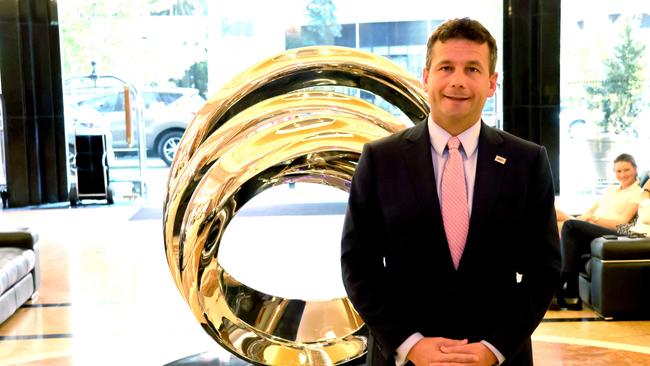New Zealand’s indigenous treaty has failed Maori, future deputy PM says
The minister leading the dismantling of many of the nation’s dedicated Maori initiatives and the restructure of its public service says NZ’s 50-year indigenous treaty experiment has failed to deliver better outcomes for Maori.

The New Zealand minister leading the dismantling of many of the nation’s dedicated Maori initiatives and the restructure of its public service says New Zealand’s 50-year indigenous treaty experiment has failed to deliver better outcomes for the Maori people.
New Zealand Minister for Regulation David Seymour – who in May will become deputy prime minister under the agreement struck last year to form government between Christopher Luxon’s National Party, Winston Peters’ New Zealand First and Mr Seymour’s ACT – told The Australian the greater significance attached to the Treaty of Waitangi since the 1970s had proved “inherently divisive” and had not succeeded in improving the way of life for Maori.
The Treaty of Waitangi, signed in 1840 by British Captain William Hobson and Maori chiefs when the British Crown was establishing colonies in New Zealand, has in recent decades seen Maori perspectives offered greater consideration in a wide array of public policy matters.
But the Luxon government has looked to reverse that trend since coming to power in late 2023. Most notably, it moved to disband the Maori Health Authority, triggering protests across the country as the government was accused of dismantling Maori rights.
Mr Seymour said his government’s efforts were focused on correcting the “inherently divisive” interpretation of principles under the treaty.
“One thing that is clear is that we haven’t made major progress in improving outcomes for Maori by going down that divisive path,” he said.
“Even if you were someone who said, ‘Okay, I don’t like dividing people by race, but I think it might be worth it if it works out’, well, the answer is it hasn’t.”
Mr Seymour’s comments come amid ongoing debate in Australia about a potential Indigenous treaty, with former Greens senator Lidia Thorpe last week calling for a treaty during her protest in front of King Charles. The Uluru Statement from the Heart called for the Indigenous voice to be followed by a treaty, and many Indigenous leaders still want the government to pursue the next stage despite last year’s defeat of the voice referendum.
Mr Seymour said Australia’s rejection of the voice showed Australians intuitively understood the risks of ascribing rights based on race.
“As soon as you say people could have different political rights based on their ancestry, then you go to a very bad place. New Zealand’s been on that path for 50 years,” Mr Seymour said.
“I am, dare I say, the main person who is either brave or stupid enough to try and reverse that.”
Mr Seymour was in Perth for a series of events after being brought to the WA capital by Liberal Party candidate Jonathan Huston, who is trying to reclaim the formerly blue-ribbon seat of Nedlands at the next state election.
A self-described classical libertarian, Mr Seymour is also New Zealand’s first-ever Minister for Regulation and has set his sights on overhauling the country’s public service.
He has already slashed 6000 public service roles and told The Australian he has plans to cut many more.
New Zealand’s public service grew from 47,000 people to 62,000 under Jacinda Ardern’s government, and Mr Seymour says he is aiming to get those numbers back to the former.
Deregulating New Zealand, he says, is an “endless” role. The government is unwinding stringent legislation aimed at improving the earthquake resiliency of buildings and which required tens of billions of dollars in upgrades. Early childhood education, he says, is “insanely over-regulated” and rules governing the importation of agricultural and horticultural products are also set to be simplified.
He is also trying to drive a culture shift within the public service.
“Part of it is training the regulatory workforce that their job is actually to help New Zealanders comply with the law and get on with their lives, not to wield power over their fellow citizens just because they can. Obviously this is quite a learning curve, starting with the ones at the airport,” he said.
Asked about the Albanese government’s decision to tighten the loopholes that had led to an increase in the number of foreign criminals – predominantly New Zealanders – who were able to avoid deportation, Mr Seymour said he understood why Australian politicians saw the attraction in making it harder for those foreigners to remain here.
But he said there was an ethical case for Australia to keep those foreign criminals who had spent much of their lives here.
“There’s an argument you can make that these people who have grown up in Australia, they’re a product of Australia’s efforts in relation to education, welfare and justice,” he said.
“Maybe there’s a sense of ‘you broke it, you bought it’.”
While Australia and New Zealand have drifted apart in recent decades on defence issues, Mr Seymour said his government was absolutely resolute in deciding not to abandon its alliance with Australia.
He also said his government was well aware of the vast difference between Australian and New Zealand defence spending as a percentage of GDP.
“Anyone can say that they want to invest more in defence. The hard part is, what do you give up in order to achieve that?” he said.
“I think that will be the discussion in New Zealand over the coming year or two: Are we prepared to raise taxes, borrow or reduce spending elsewhere?”




To join the conversation, please log in. Don't have an account? Register
Join the conversation, you are commenting as Logout